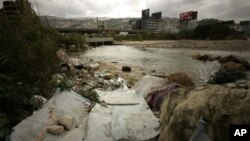Lebanon has the most water of any Middle Eastern country, but is subject to persistent, chronic water shortages due to mismanagement and poor infrastructure.
Torrents of cool, clear water cascade from one of Lebanon's many mountain springs at Ain So'ofar along an idyllic, country road overlooked by snow-capped peaks. From Biblical times, the country has been known as an oasis of lush greenery and abundant water resources.
An official Lebanese government atlas indicates the country has 12 small rivers, more than 36 streams and thousands of springs and waterfalls.
Despite those resources, which make Lebanon one of the most fertile Middle East nations, chronic shortages plague the population and the need to buy water is a constant headache.
At Lebanon's Litani River dam off of man-made Lake Qaraoun, electricity turbines churn at full speed after a winter of copious rainfall. Economics Professor Louis Hobeika of Lebanon's Notre Dame University says Lebanon has a persistent water crisis and needs to build more dams to exploit its water resources:
"We have a problem of water: waste in the sea and waste in taking advantage of rainfall. The rainfall comes in and gets wasted in the sea. So, we are not storing water," he noted. "We tried to build [several new] dams in Chabrouh and we are starting one in the Bekaa, but [that is] still not enough; Lebanon needs a dozen dams to store water. Plus, the Lebanese do not use water wisely. There is lots of waste in using it. Plus, monetary resources, like fees, are not properly collected, and therefore, we have a problem of funding investment in this sector."
Lebanon also exports at least seven brands of mineral water to its parched, water-starved neighbors on the Arabian Peninsula and in the Gulf. But for those Lebanese who are lucky enough to have government water, the service usually operates no more than three days a week.
Some experts have been predicting Lebanon will have a water crisis on its hands in the next five years, but Louis Hobeika says the crisis has already begun:
"We already have a crisis. People in Beirut and all over buy water," he explained. "Besides, what you get from the government, they buy tanks of water, which costs a lot. In my house, for example the water is not drinkable. We buy mineral water. We have regular water, but we do not drink the tap water. In many areas of Lebanon, especially in the high mountains, water does not even reach them, so they end up buying tanks of water, and it is quite expensive."
Lebanon has also gotten into frequent cross-border political quarrels in recent years with its neighbors.
In 2006, Lebanon complained Israel had sabotaged water pumps on the Wazzani River near the border, in addition to unsubstantiated charges it was "stealing water." The Lebanese daily al-Mustaqbal also reported in 2008 that neighboring Syria's irrigation ministry had been caught "digging wells on Lebanese territory," and "pumping the water into tanks on the Syrian side of the border."
Lebanon Has Lots of Water, Chronic Shortages Persist

Lebanon has most water of any Middle Eastern country, but subject to mismanagement, poor infrastructure



